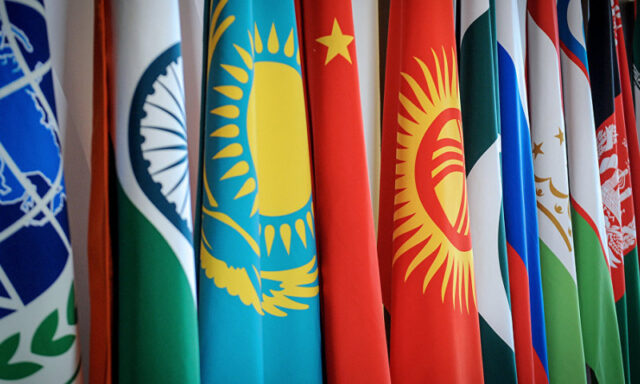The Shanghai cooperation Organization (SCO) was formed on 15th June 2001. It is a permanent intergovernmental international organisation. It is a political, economic and military organisation aiming to maintain peace, security and stability in the region. The SCO Charter was signed in 2002 and entered into force in 2003 and the official languages are Russian and Chinese.
Members:
Kazakhstan, China, Kyrgyzstan, Russia, Tajikistan, Uzbekistan, India and Pakistan
Observer states:
Afghanistan, Belarus, Iran and Mongolia
Dialogue Partner:
Azerbaijan, Armenia, Cambodia, Nepal, Turkey and Sri Lanka
Objectives:
- Strengthening mutual trust and neighbourliness among the member states.
- Promoting effective cooperation in -politics, trade & economy, research & technology and culture.
- Enhancing ties in education, energy, transport, tourism, environmental protection, etc.
- Maintain and ensure peace, security and stability in the region.
- Establishment of a democratic, fair and rational new international political & economic order.
Strengths of SCO:
- The SCO covers 40%of the global population, nearly 20% of the global GDP and 22% of the world’s land mass.
- The SCO has a strategically important role in Asia due to its geographical significance – this enables it to control the Central Asia and limit the American influence in region.
- SCO is seen as counterweight to the North Atlantic Treaty Organisation.
Afghanistan and SCO:
Afghanistan has been engaged with the SCO for over 15 years. It signed a protocol establishing the SCO-Afghanistan contact group in 2005. In 2012, Afghanistan became an observer in the SCO. In 2015, Afghanistan signed a protocol on counterterrorism with the Regional Anti-Terrorist Structure of the SCO.
The SCO group on Afghanistan met in Tajikistan July 14 to discuss the Afghan issue, including Uzbekistan’s newly proposed Plan of Practical Measures to Promote the Socioeconomic Restoration of Afghanistan. The meeting bought these leaders together and agreed to work together to promote cooperation and fight against tension and terrorism in the region.
Roadmap for Afghanistan:
External affairs minister S. Jaishankar has put forth the roadmap at a meeting of the SCO foreign ministers’ contact group on Afghanistan in Dushanbe amid growing global concerns over the Taliban fighters gaining control over large parts of the country.
- An independent, neutral, unified, peaceful, democratic and prosperous nation
- Ceasing violence and terrorist attacks against civilians and state representatives, settle conflict through political dialogue, and respect interests of all ethnic groups
- Ensure that neighbours are not threatened by terrorism, separatism and extremism
S Jaishankar meets FM Wang Yi of China:
External Affairs Minister Jaishankar met the Foreign Minister on the side-lines of SCO. He mentioned how the trouble on the Eastern Ladakh has been impacting the bilateral ties in a ‘negative manner’. Discussions also focused on the outstanding issues along the LAC in the Western sector. Jaishankar emphasized on the maintenance of peace and cooperation in the border areas.
As the 11th rounds of talk have already happened, there has been no resolution on the borders engagement. According to the military officials, each side has around 50,000 to 60,000 troops along LAC in the region.









